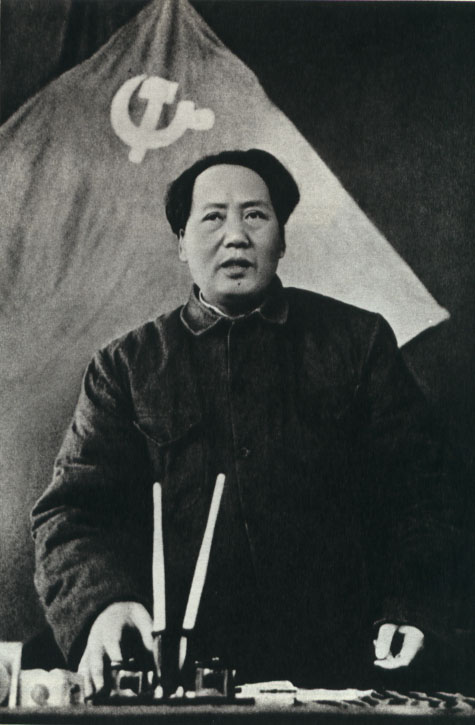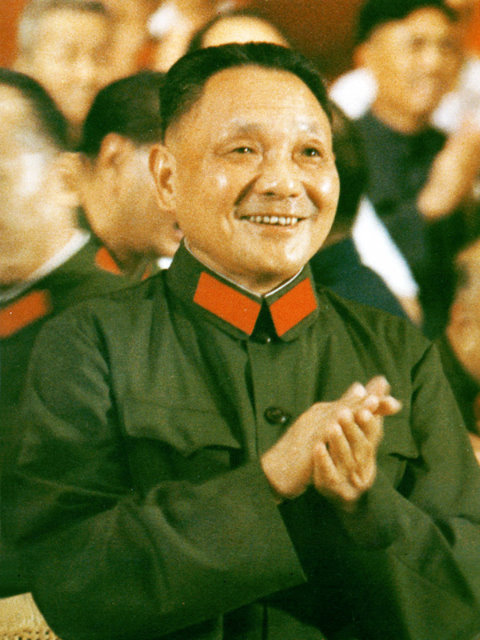Chapter I
Asami
Banned
((And here we have Sakura_F writing a timeline about Modern China. I'm pretty sure I'm going to fuck it all up, but I wanted to write this anyway.))
October 1, 1949 inaugurated a new era in Chinese history. The Communist Party of China had won out in the civil war against the Kuomintang Nationalists that had lasted for over twenty years; and through a Japanese invasion that had left millions of Chinese dead; and the nation demoralized.
Mao Tse-tung became the first leader of modern China, proclaiming the establishment of the People's Republic of China (中华人民共和国 / Zhōnghuá Rénmín Gònghéguó); and through this, began to pilot the future of China through his newly established Stalinist policies.
Relations between the newly established People's Republic of China and their former benefactors, the Union of Soviet Socialist Republics, faced some difficulty in 1949 after the establishment of new leadership under General Georgy Zhukov, after the sudden death of Joseph Stalin in September 1949. Zhukov's leadership was unusual for Russia, but Zhukov managed to prevent a counter-coup from being organized; cementing his political authority by early 1950; relations between China and the Soviet Union soon began to spoil as Zhukov piloted a process of “de-Stalinization” after a speech to the Supreme Soviet given in late February 1950. Zhukov was not adverse to Stalin’s policies of purging, however. After conducting a purge of power-rival Beria and the “unruly NKVD”, as well as purging Stalinist influences in the Soviet sphere of influence and reconciling with Josip Broz Tito; Zhukov turned his attentions to Asia.
In April 1950, Kim Il-sung, leader of the Democratic People’s Republic of Korea, was ousted by the anti-Stalinist influence of the Soviet Union; and a much more “moderate” communist figure was placed into power under Soviet suzerainty. This had been done because of Kim’s fervent desire to get into a protracted war with the Capitalist West to reunite the Korean Peninsula. This new moderate Soviet-backed government eased off tensions and instead made overtures to reach to the South and establish a consistent, peaceful border.
This new Soviet satellite state in North Korea, as well as the loss of Chinese geopolitical power through the negotiations of a plan to invade South Korea significantly damaged Mao's standing internally, and externally; as he looked to find a means to expanding his power base against growing moderate influence in his own party and state. In mid-1950, Mao began to pilot a policy of collectivizing land under a government monopoly on agriculture in order to fund industrialization. This policy proved significantly unpopular with the many Chinese peasants who wanted to keep their land and continue their policies.
The presumed "Father of Modern China" soon faced mounting opposition within his own party as he had little victories to show after the one in 1949; the Nationalists had safely evacuated to Taiwan, the People's Republic remained the unrecognized shadow China, and China had no allies at all.
Mao, desperate to find an outlet for his own, began to increase the amount of aid going into Indochina to fund communist partisans there; however; after three years of unsuccessful actions in Indochina, poor payment of the People's Liberation Army, and the discontent peasantry, Mao had run out of time and out of support from the party cadres. An abortive attempt by him to coordinate a purge of those who opposed his policies was the final step over the line for the cadres, who quickly encircled Mao politically, and then attacked. The leader of the counter-purge, Deng Xiaoping, offered to Mao a rather poor set of choices; Mao opted for his offer of a "way out" out of respect, and to be remembered as China's greatest elder statesman in generations.
So, after a brief four years as the leader of China, Mao was unceremoniously "retired" by the Politburo, and thanked for his "years of service to China", and that his "victories in the Long March, the Revolution, and the victories of the Civil War would never be forgotten." Mao's political career had ended quickly, and China moved on to a new leader.
Modern China recognizes Mao Tse-tung's victories as key to the growth of the state, but very few, if any Chinese, talk about his time as an actual administrator of China.
Qilai! Qilai!
A history of Modern China

Mao Tse-tung (Communist Party)
(1949 - 1953)
"The Helmsman"
A history of Modern China

Mao Tse-tung (Communist Party)
(1949 - 1953)
"The Helmsman"
October 1, 1949 inaugurated a new era in Chinese history. The Communist Party of China had won out in the civil war against the Kuomintang Nationalists that had lasted for over twenty years; and through a Japanese invasion that had left millions of Chinese dead; and the nation demoralized.
Mao Tse-tung became the first leader of modern China, proclaiming the establishment of the People's Republic of China (中华人民共和国 / Zhōnghuá Rénmín Gònghéguó); and through this, began to pilot the future of China through his newly established Stalinist policies.
Relations between the newly established People's Republic of China and their former benefactors, the Union of Soviet Socialist Republics, faced some difficulty in 1949 after the establishment of new leadership under General Georgy Zhukov, after the sudden death of Joseph Stalin in September 1949. Zhukov's leadership was unusual for Russia, but Zhukov managed to prevent a counter-coup from being organized; cementing his political authority by early 1950; relations between China and the Soviet Union soon began to spoil as Zhukov piloted a process of “de-Stalinization” after a speech to the Supreme Soviet given in late February 1950. Zhukov was not adverse to Stalin’s policies of purging, however. After conducting a purge of power-rival Beria and the “unruly NKVD”, as well as purging Stalinist influences in the Soviet sphere of influence and reconciling with Josip Broz Tito; Zhukov turned his attentions to Asia.
In April 1950, Kim Il-sung, leader of the Democratic People’s Republic of Korea, was ousted by the anti-Stalinist influence of the Soviet Union; and a much more “moderate” communist figure was placed into power under Soviet suzerainty. This had been done because of Kim’s fervent desire to get into a protracted war with the Capitalist West to reunite the Korean Peninsula. This new moderate Soviet-backed government eased off tensions and instead made overtures to reach to the South and establish a consistent, peaceful border.
This new Soviet satellite state in North Korea, as well as the loss of Chinese geopolitical power through the negotiations of a plan to invade South Korea significantly damaged Mao's standing internally, and externally; as he looked to find a means to expanding his power base against growing moderate influence in his own party and state. In mid-1950, Mao began to pilot a policy of collectivizing land under a government monopoly on agriculture in order to fund industrialization. This policy proved significantly unpopular with the many Chinese peasants who wanted to keep their land and continue their policies.
The presumed "Father of Modern China" soon faced mounting opposition within his own party as he had little victories to show after the one in 1949; the Nationalists had safely evacuated to Taiwan, the People's Republic remained the unrecognized shadow China, and China had no allies at all.
Mao, desperate to find an outlet for his own, began to increase the amount of aid going into Indochina to fund communist partisans there; however; after three years of unsuccessful actions in Indochina, poor payment of the People's Liberation Army, and the discontent peasantry, Mao had run out of time and out of support from the party cadres. An abortive attempt by him to coordinate a purge of those who opposed his policies was the final step over the line for the cadres, who quickly encircled Mao politically, and then attacked. The leader of the counter-purge, Deng Xiaoping, offered to Mao a rather poor set of choices; Mao opted for his offer of a "way out" out of respect, and to be remembered as China's greatest elder statesman in generations.
So, after a brief four years as the leader of China, Mao was unceremoniously "retired" by the Politburo, and thanked for his "years of service to China", and that his "victories in the Long March, the Revolution, and the victories of the Civil War would never be forgotten." Mao's political career had ended quickly, and China moved on to a new leader.
Modern China recognizes Mao Tse-tung's victories as key to the growth of the state, but very few, if any Chinese, talk about his time as an actual administrator of China.
Last edited:


